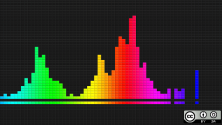Firefox for mobile, codenamed Fennec, is the build of the Mozilla Firefox web browser for devices such as Android smartphones and tablet computers. Fennec is available in multiple languages, and just a few months ago, was launched in the Hindi language along with others like: Assamese, Bengali (India), Gujarati, Kannada, Maithili, Malayalam, Marathi, Oriya, Punjabi, Tamil, and Telugu.
 These 12 Indic languages represent the largest number of new languages that have been shipped in a single Fennec release. So, a little belated, the Hindi community celebrated with a small, organized event showcasing and celebrating the success of the hard work done by the community. Around 30 volunteers and FOSS enthusiasts participated gathered for the event, organized by Mozilla, in Pune, India. A cake with the Fennec image was cut by a well-known figure in the language technology field in India, Mahesh Kulkarni. He is also head of the C-DAC GIST group and country manager of W3C India.
These 12 Indic languages represent the largest number of new languages that have been shipped in a single Fennec release. So, a little belated, the Hindi community celebrated with a small, organized event showcasing and celebrating the success of the hard work done by the community. Around 30 volunteers and FOSS enthusiasts participated gathered for the event, organized by Mozilla, in Pune, India. A cake with the Fennec image was cut by a well-known figure in the language technology field in India, Mahesh Kulkarni. He is also head of the C-DAC GIST group and country manager of W3C India.
Sharing his experience with the participants in event, he said that end-to-end experience of localization is in need and should not be only of ornamental value. In the localization field, only the first level of work has happened up until now, and there is need to work on the second level of localization. The community present at the event discussed the challenges of localization in Indian languages and planned to do some concrete activities to help. Those in attendance were from the Mozilla Hindi Team, involved in Mozilla localization in Hindi, and from the Pune Linux User Group (PLUG), along with some different community members of Mozilla working in different fields other than localization.

These volunteer teams working for Mozilla in India, and around the world, are motivated mostly by the idea that they can create high quality software for the speakers of their language and help the speakers of there language to better understand browsers and the web. The peer review and passion of Mozilla's localization team often results in higher quality translation work than could be produced from paid translation contractors. The details of the localization process is on the Mozilla Wiki.
Both content on the web and the user interface of the browser needs to be provided in the native language of users to reach the next billion people that will start using and gaining value from the web over the next few years. Many of these users only have knowledge of local languages. Mozilla will need continue to be a catalyst for advancement of these languages' presence on the web in order to reach those users.
The localization in Mozilla products is governed with the principle of democracy—by the people, for the people, of the people—along with great process and passion. For example, Mozilla's German localization started in very simple and small way. A college student decided to make a German version of Firefox as a personal gift to his father. With the code avaiable as open source, he was able to do this. Similarly, I started working on different open source projects when I joined with Red Hat for Hindi language ten years ago. I have since come to know more about Mozilla localization work, and I started the Hindi language work on Mozilla.
Now most of the product of Mozilla is fully localized in Hindi! Nowadays, the Mozilla localization process is very smooth. The translation can be done on the Pootle platform. For Hindi on Fennec, the translation and testing was done collaboratively. Volunteers are always welcome!







1 Comment